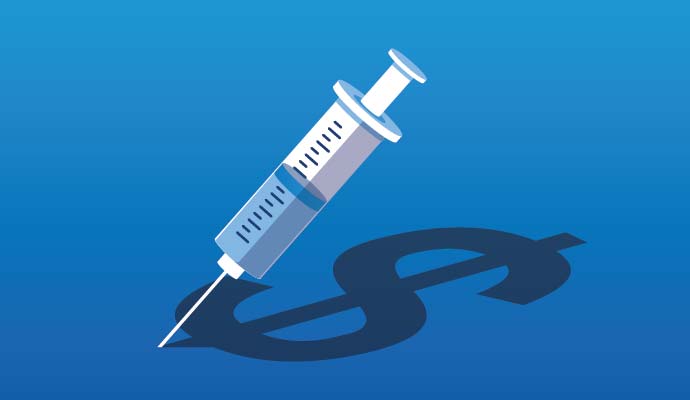Remdesivir’s $2,340 Price Tag Well Below Value, Gilead CEO Says
Daniel O’ Day said the price for remdesivir as a COVID-19 treatment will ensure access to the drug which has shown to reduce hospitalized days among infected patients.

Source: Thinkstock
- Gilead will price its COVID-19 drug, remdesivir, at $390 per vial to ensure broad and equitable access during the global pandemic, according to an official letter from Gilead chairman and CEO, Daniel O’Day.
For a typical five-day treatment course, that equates to about $2,340 per patient.
In normal circumstances, O’Day said that Gilead would price medicine according to the value it provides. For example, the NIAID study of hospitalized COVID-19 patients showed that remdesivir shorted time to recovery by an average of four days.
Earlier hospital discharge allows the US to save nearly $12,000 per patient. So, given the immediate savings, researchers were able to see direct benefit to the health system.
But because so many patients require immediate access to care at the time of urgent global need, Gilead priced remdesivir well below this value to ensure equitable access to all.
“Part of the intent behind our decision was to remove the need for country by country negotiations on price. We discounted the price to a level that is affordable for developed countries with the lowest purchasing power,” O’Day said in the letter.
“This price will be offered to all governments in developed countries around the world where remdesivir is approved or authorized for use. At the current price of $390 per vial, remdesivir is positioned to achieve the aim of providing immediate net savings for healthcare systems.”
The price for private insurance companies will be $520 per vial given the way the US system is set up and the discounts that government healthcare programs receive.
Gilead said that they approached the price negotiation with the aim of helping as many patients as possible in the most responsible way.
“We recognized the need to do things differently to reflect the exceptional circumstances of the pandemic. Now, as we transition beyond the donation period and set a price for remdesivir, the same principle applies,” O’Day said.
Remdesivir is the first antiviral to demonstrate patient improvement in clinical trials for COVID-19.
At the beginning of June, Gilead announced that in its Phase 3 clinical trial, patients in the five-day remdesivir treatment group were 65 percent more likely to see clinical improvement at Day 11 versus individuals receiving standard care.
From there, the company determined that intervening earlier in the disease process with a five-day treatment course could result in more significantimprovements.
But there has been speculation about how Gilead was going to price remdesivir, given the high demand for the drug during COVID-19.
“Our work on remdesivir is far from done. We continue to explore its potential to help in this pandemic in various ways, such as evaluating treatment earlier in the course of the disease, in outpatient settings, with an inhaled formulation, in additional patient groups and in combination with other therapies,” O’Day said.
“As we accumulate more data from global clinical trials and initiate many additional studies, we will understand more about the full value of remdesivir over time. Our teams also remain focused on increasing supplies to meet the high global demand.”
By the end of this year, Gilead expects its investment on the development and manufacturing of remdesivir to exceed $1 billion.
Most recently, Gilead entered into an agreement with HHS where HHS and other states will continue to manage allocation to hospitals until the end of September. After this period, HHS will no longer manage allocation.
“In the developing world, where healthcare resources, infrastructure and economics are so different, we have entered into agreements with generic manufacturers to deliver treatment at a substantially lower cost. These alternative solutions are designed to ensure that all countries in the world can provide access to treatment,” O’Day said.
